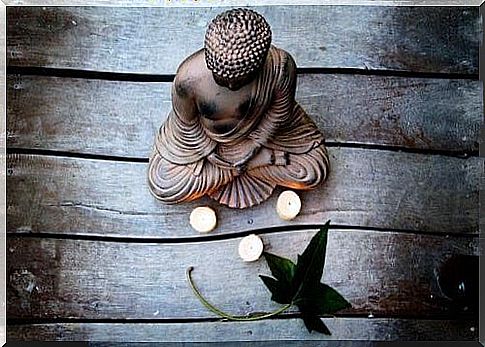Dealing With Difficult Times According To Buddhism

Goodwill or a positive attitude are not enough to cope with difficult times, although they can help. Existence does not follow an easy to interpret script.
Contradictions, shortcomings, and unfulfilled desires are all elements of our daily landscape. A peculiarity of those who suffer from neurosis is to think that they are the only ones with problems.
Buddhists have a completely different way of dealing with problems. Unlike most Westerners, they don’t try to deny them or get rid of them as soon as possible. Their attitude is definitely more adaptive.
But not all situations are the same. Finding yourself with a broken phone is a far cry from going through a divorce or the death of a loved one. Nonetheless, Buddhism teaches us that these situations are an opportunity to develop indispensable skills, which help us cope with difficult times. Let’s see what they are.
Strategies for dealing with difficult times according to Buddhism
1. Don’t fight against the current
Don’t do this, especially if the current is raging. A smart way to deal with difficult times is not to oppose them. When circumstances are adverse, there is a great temptation to expend all energy to avoid the inevitable.
Yet, accepting is the first and indispensable step in finding the solution to a problem and recognizing its limits. Accept reality, however adverse it may be to your desires. Such an attitude saves us unnecessary effort and makes us adopt a more realistic and positive perspective.

2. Looking inside is essential to be able to face difficult times
It is extremely easy to fall into the temptation to justify difficult situations by blaming something or someone outside of us. It is true that many difficulties are influenced by factors outside our control, but it is us, and only us, who choose how to react.
We can always act in any situation, however difficult, especially if we turn our gaze to our inner universe. Before looking for a culprit or accusing the fate of having turned our backs, let’s try to open our interiority to these difficult experiences, so that they do not contaminate us.
3. Every mistake or lack offers a lesson
To better cope with difficult times, we should stop seeing them as unpleasant, as something to be eradicated as soon as possible. On the contrary, extreme comfort often makes us superb.
A difficult situation is always an opportunity to learn something about ourselves or about external reality. Pain reveals new aspects of existence, of ourselves or of those around us. It is important to give it the right importance.
4. What must happen happens
The events are the result of multiple factors that have come together. Just as every great success comes for a reason, difficulties or a loss also have a purpose. The world goes as it should go.
The present is a synthesis of what has been. Every event, every human being is the fruit of what precedes it. Reality manifests itself as it should be, neither for better nor for worse.
When we manage to frame events from this perspective, we are able to accept them and integrate them in the best possible way into our personal history.
5. Now, not later
Difficult times are a demand for change. A mistake, a wrong perspective or an action may have recalled a situation that we experience as problematic.
The right thing to do is to initiate changes within ourselves, in the here and now. Without waiting for the storm to pass to make the appropriate decisions. It is in the midst of the cyclone that we must mobilize all resources to deal with it.

6. Face difficult times with a smile
Smiles are the best antidote to despair and pessimism. It becomes even more valuable in moments when all doors seem to be locked and the problems greater than our ability to deal with them.
In these situations, the smile is a blessing. It is possible that it does not come spontaneously, therefore it must be sought. In what situations do you find yourself smiling? They are perhaps the ones you should look for the most.
7. Don’t play victims
Victimization provides some pleasure to those who use it. It also offers several benefits, which however quickly turn out to be ephemeral. It presupposes the renunciation of assuming general control and implementing effective coping strategies starting from the resources in one’s possession.
Victimizing oneself prolongs difficulties and limits autonomy. In the long run it solves nothing, and moreover it causes a stalemate. It is not a reasonable choice, as it further limits in the long run.
Conclusions
The 7 Buddhist strategies for dealing with difficult times are healthy principles that allow you to develop patience, strengthen personal power and learn tolerance towards the most complex situations in order to take full advantage of them.









